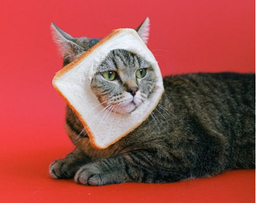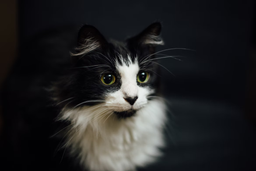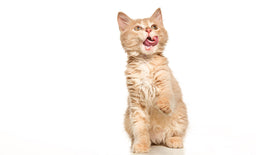Baby food for cats—yes or pass?
For most cat parents, their feline companion will always be a baby, no matter how big they grow! But does that mean they should eat like one, too? Is baby food for cats a suitable diet choice?
Out of all “people food,” pureed meat, veggies, and fruit are probably the safest option for our furry friends. Products for infants are typically additive-free and light on the tummy, but that doesn’t mean specific risks aren’t involved. Let’s see which recipes are cat-safe and which ingredients to watch out for when buying baby food for your cat.
Is baby food safe for cats?
Baby food is a puree made with meat, veggies, or various fruits. Most recipes are cat-safe, but some can contain ingredients harmful to felines. If you want to give your cat some baby food, make sure it doesn’t have:
- Allium plants—Meat-based baby food is sometimes seasoned with onions and garlic. Cats shouldn’t eat allium plants because they can cause temporary or long-term anaemia. The oxidants in the veggies speed up hemolysis, i.e. the breakdown of red blood cells, impeding the oxygen delivery. Besides anaemia, some cats can develop chronic kidney disease (CKD), especially if they’re genetically predisposed to it, like Persian, Abyssinian, and Siamese cats
- Citrus fruit—Don’t give your kitten food containing lemons or oranges because they’re highly toxic to felines. The essential oils in citruses can provoke gastrointestinal problems and affect the cat’s central nervous system. A spoonful of citrusy baby food could cause vomiting, diarrhoea, abdominal pain, and seizures. Allergy-prone breeds, like the sensitive Bengal, can even develop skin irritation
- Grapes—Veterinarians aren’t sure which substance in grapes is the root of the toxicosis. It could be tartaric acid, which is generally toxic to pets, or a certain fungal toxin in the fruit. If your cat eats baby food with grapes, it could cause acute kidney disease
- Chocolate—Baby food with chocolate or cocoa contains caffeine, which affects the feline’s central nervous system and heart function. The substance causes vomiting and diarrhoea, abnormal heart rhythm, tremors, and seizures in cats
Can baby cats eat baby food?
Weaning kittens can eat baby food, provided it’s unseasoned and free of harmful ingredients (e.g. toxic fruits or veggies, caffeine, etc.). If the kitty is still nursing, they shouldn’t have any solid food. While pureed meat isn’t exactly solid, it’s still unsuited for kittens who aren’t old enough to feed independently.
In the first three to four weeks of their lives, kittens can only stomach breast milk or milk replacer formulas (KMR) if they’re separated from their mothers. KMR supports steady growth and weight development while safeguarding your kitten’s sensitive tummies. That’s why you shouldn’t give your kitty cow milk or even plant-based alternatives (e.g. soya or almond), or they’ll get diarrhoea.
Once the kitten’s eyes are fully open and they get their first set of teeth, you can expand their meal plan. Baby food is pretty mild, so your kitty can have it as a treat. When it comes to their daily meals, you should serve them specially formulated kitten food or high-quality wet food.

Kittens are sensitive during their first few weeks and can’t digest baby food.
Source: 12029
Can my elderly cat eat baby food?
Older cats have different eating habits from kittens and full-grown felines because of their deteriorating health. As they mature, cats are more likely to experience
Baby food can work well as a dietary supplement for the ageing feline. The soft, mushy texture is perfect for cats with sensitive teeth. Purees are also highly digestible and quite palatable, so they might kick-start their appetite.
You should still encourage your oldtimer to eat cat food every day since it’s more nourishing. If they struggle with chewing, you can soften the meal with hot water, or better yet—a hearty (but unseasoned) soup or broth!
How often can I feed my cat baby food?
If the recipe doesn’t have any problematic ingredients, it’s okay to give your cat baby food as a treat, i.e. once or twice per week. Complementary food is an excellent way to ensure your cat doesn’t get bored with their meal plan. If you stick to the recommended calorie intake for indoor cats (40 calories per one kg), moderate servings of baby food are okay.
Remember not to go overboard with the portions. Half a teaspoon (2–3 g) of baby food every now and then is more than enough for cats. You can also hand-feed your pet by sticking the tip of your finger in the puree and letting them lick it.
Feeding your cat baby food when they’re sick
Baby food can come in handy when your cat is recovering from an illness or infection. After being sick for a while, felines can lose their appetite for regular cat food.
Small servings of baby food can keep them nourished until they return to their standard meal plan. The recipes are designed for infants with sensitive stomachs, so they’re incredibly mild. Additionally, more than 20% of baby food made in the UK is organic, so it’s free of artificial flavouring, preservatives, and other additives that have no place in your cat’s meals.
Remember, baby food for sick cats should be transitional. As soon as your pet gets better, start giving them regular cat food.
What’s the best baby food for cats?

I heard we’re having chicken puree for dinner tonight.
Source: Dorothea OLDANI
Since cats are obligate carnivores, the best choice would be unseasoned meat-based baby food. If you’re buying off-the-shelf products, double-check for herbs, spices, and other toxic ingredients. Avoid recipes that include starchy vegetables, rice, and other high-carb ingredients since they don’t have any biological value.
Felines are attuned to a carnivorous diet and lack the enzymes to break down carbs. When given in moderation, the grain in baby food won’t hurt them, but binge-eating can lead to indigestion. Cats shouldn’t have more than 3% carbs in their daily meals.
Ultimately, the best baby food for cats is homemade pureed meat since you’ll have complete control of the recipe. Here’s how to make baby food for cats at home:
- Put some chicken or turkey in water. Don’t add herbs, spices, vinegar, or oil
- Gently simmer until the meat’s entirely cooked
- Let the meat cool for about ten minutes
- Put it in a food processor and add 180 ml of water (or KMR for kittens)
- Blend it into a puree
Avoid adding bacon, sausage, pork rinds, and other deli meat in the mix since it’s too fatty. Use lean ham or giblets if you want to “season” the puree with some extra protein.
You can also include veggies and fruit in your homemade baby food for cats, including:
|
Fruits |
Veggies |
Plants and fungi |
|
|
…and what’s the best food for cats?
As digestible and delicious as baby food can be, it’s still not enough to cover your cat’s nutritional needs. The feline metabolism is conditioned to a meat-exclusive diet and requires high amounts of protein to function properly.
Cats can only harness protein from animal tissue, so veggies and other plant-based sources are obsolete. Protein is responsible for the feline’s muscle formation, tissue growth, immune resilience, and vital organ function. It’s also their primary energy source since cats aren’t fueled by carbs.
Without protein, your carnivorous pet won’t be able to synthesise essential amino acids, primarily taurine and arginine. An amino acid deficiency can result in
- Retinal degeneration
- Cardiomyopathy
- Altered white-cell function
- Developmental issues

Cats should have meat for breakfast, lunch, dinner, and dessert.
Image (c) Untamed
In the wild, cats would get taurine and other indispensable nutrients from fresh meat, mainly rodents, game, and birds. An entirely raw diet presents a health hazard for indoor cats. Raw meat can contain harmful bacteria and parasites that cause life-threatening infections.
The best choice for your meat-eating pet is a wet-food-based diet. Both semi-moist and moist products are made to mimic the feline’s natural feeding pattern in terms of nutrients and are entirely free of microbial pathogens. Unlike kibble (i.e. dry food) that’s much more processed, wet food is rich in moisture, protein, and bioavailable vitamins and minerals that'll keep your cat in tip-top shape!
Browsing for the best cat food? Get Untamed!
When it comes to high-quality cat food, Untamed is unmatched! Our healthy and delicious products are:
- High in protein—One serving of Untamed food delivers twice as much animal protein as the industry standard
- Made with whole meat—We make each recipe with human-grade whole meat that’s packed with bioavailable protein, vitamins, and minerals
- Hypoallergenic—All our recipes are vet-formulated and free from grain fillers, preservatives, animal derivatives, and all known allergens
- Ethically sourced—Our chicken and duck meats are ethically sourced, and all our fish is sustainably caught

Untamed food is attuned to your pet’s specific physiological needs. We know what cats want and are happy to give it to them!
Image (c) Untamed
Our food's nutritional properties can aid your cat’s overall health. Clients who’ve been with us for a long time have witnessed significant improvements in their pet’s appetite, gastrointestinal health, and physical appearance. Based on the feedback from other members of our happy clowder, you can expect the following health benefits:
|
Timeline |
Health benefits |
|
Within a week |
|
|
After two months |
|
|
Within four months |
|
|
Life-long benefits |
|
Explore our incredible recipes and create a customised menu!
If you fill out a simple questionnaire, you'll have the opportunity to create a personalised menu for your cat! Choose the perfect combination of Untamed products based on your furry friend’s food preferences, allergies, and life stage.
We have a selection of chicken and fish delicacies in gravy and jelly to satisfy picky eaters. You can’t go wrong with Untamed since all our products are made with premium meat cuts, including:
- Chicken breast
- Duck breast
- Salmon fillet
- Tuna steak
- Sardine and mackerel fillet
- Prawns
- Shrimp
Check out our most popular recipes in the table below:
|
Our menu |
Details |
|
Chocka Chicken in Jelly* |
Human-grade chicken dipped in mouth-watering, light jelly |
|
Chocka Chicken with Duck in Jelly |
Fresh chicken breast and irresistible duck meat, served in jelly |
|
Chocka Chicken in Gravy* |
Shredded chicken breast in thick, natural gravy |
|
Tuck-in Tuna in Jelly* |
Dolphin-safe tuna steak in appetising and hearty fish broth |
|
Tuck-in Tuna with Salmon in Jelly |
Tuna steak in jelly with high-quality salmon fillet to enhance the taste |
|
Tuck-in Tuna with Shrimp in Jelly |
Fresh tuna served with shrimp in jelly |
*Tuck-in Tuna and Chocka Chicken are single-protein-source recipes, perfect for sensitive cats!

Untamed’s Chocka Chicken in Jelly is irresistible to cats of all ages and breeds!
Image (c) Untamed
Join our community and get monthly supplies of Untamed food
Sign up for a trial pack and treat your cat to a real feast! All you have to do is go to our online cat food store and do this:
- Take our Try Now quiz and tell us about your cat
- Choose the best meal plan
- Confirm your order
Your trial pack of Untamed cat food will be home-delivered to you within a day. If your cat enjoys the selection, you’ll start getting monthly supplies of custom-made meal boxes.
Check out our other guides to what cats can or cannot eat:
|
|

![Best food for Ragdoll cats in the UK [Broken Down]](http://untamed.com/cdn/shop/articles/featured_best_food_for_ragdoll_cats_uk.jpg?v=1646818249&width=256)

